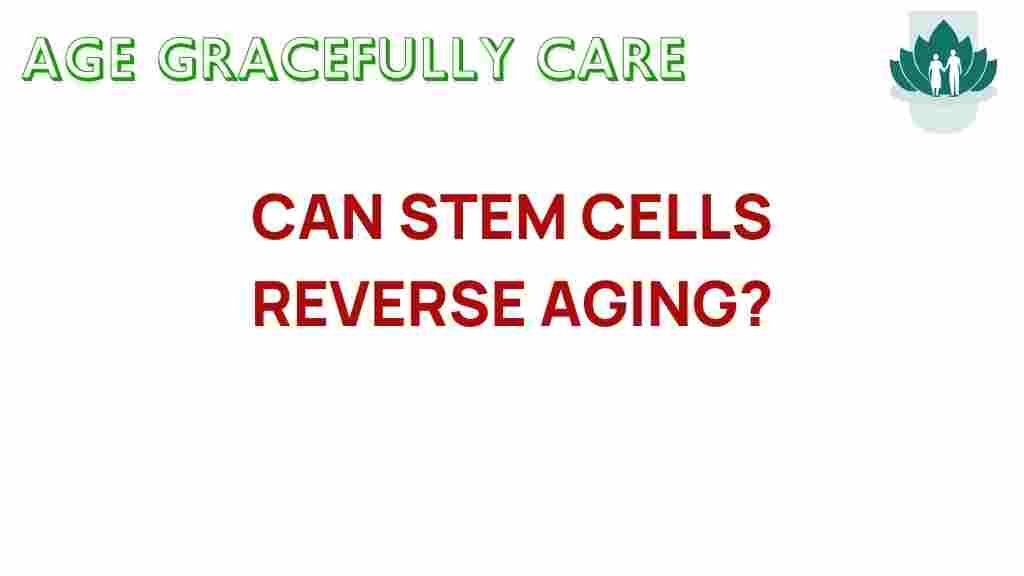Unlocking the Secrets: Can Stem Cells Reverse Aging?
The quest for longevity and the desire to maintain youthful vitality have been at the forefront of human interest for centuries. As we delve deeper into the realms of biotechnology and regenerative medicine, one question arises: can stem cells reverse aging? This article explores the potential of stem cells in combating aging, their role in regenerative medicine, and the latest research findings that are shaping our understanding of longevity and health.
Understanding Stem Cells and Aging
Stem cells are unique cells with the remarkable ability to develop into many different cell types in the body. They serve as a natural repair system, potentially dividing indefinitely to replenish other cells. As we age, the number and function of these stem cells decline, leading to the various signs and symptoms of aging. This decline in stem cell function has spurred significant interest in their role in aging and how they might be harnessed for anti-aging therapies.
The Role of Regenerative Medicine
Regenerative medicine is a branch of biomedical research that focuses on repairing, replacing, or regenerating damaged tissues and organs. It utilizes stem cells, cellular therapy, and other biotechnologies to promote healing and recovery. By understanding how to manipulate stem cells effectively, researchers aim to develop treatments that can not only slow down aging but potentially reverse its effects.
The Science Behind Stem Cells and Aging
To grasp how stem cells could reverse aging, it’s crucial to understand the biological mechanisms involved. Here are some key points:
- Cellular Senescence: As cells divide, they may become senescent, a state in which they no longer divide or function properly. This contributes to aging and age-related diseases.
- Stem Cell Exhaustion: The gradual depletion of stem cells in tissues leads to decreased regenerative capacity, impacting overall health and longevity.
- Inflammation: Chronic low-grade inflammation, often referred to as “inflammaging,” affects stem cell function and contributes to the aging process.
Research and Innovations in Stem Cell Therapy
Recent advancements in biotechnology have paved the way for innovative stem cell therapies aimed at reversing aging. Here are some noteworthy developments:
- Induced Pluripotent Stem Cells (iPSCs): Scientists can reprogram adult cells into pluripotent stem cells, which can then differentiate into any cell type. This technology has opened new avenues for regenerative medicine.
- Mesenchymal Stem Cells (MSCs): These stem cells, found in bone marrow and fat tissue, have shown promise in reducing inflammation and promoting tissue regeneration.
- Exosomes and Stem Cell-Derived Factors: Researchers are exploring the use of exosomes—small vesicles secreted by stem cells that carry proteins and genetic material—to enhance healing and rejuvenation.
Step-by-Step Process: How Stem Cells May Combat Aging
The potential for stem cells to reverse aging can be understood through a systematic approach:
- Cell Harvesting: Stem cells are extracted from the patient’s body, commonly from bone marrow or adipose tissue.
- Cell Manipulation: In a laboratory setting, these cells may be expanded or engineered to enhance their regenerative capabilities.
- Cell Administration: The processed stem cells are then reintroduced into the patient’s body, targeting areas that require repair or rejuvenation.
- Monitoring and Analysis: Following treatment, patients are monitored to assess the effectiveness of the therapy and any changes in health or aging markers.
Challenges and Troubleshooting Tips
While the prospect of using stem cells for anti-aging is exciting, several challenges remain:
- Ethical Concerns: The use of embryonic stem cells raises ethical questions that continue to be debated.
- Regulatory Hurdles: Stem cell therapies must undergo rigorous testing and approval processes before becoming widely available.
- Individual Variability: Responses to stem cell treatments can vary greatly among individuals, necessitating personalized approaches.
Troubleshooting Tips:
- Consult with qualified medical professionals who specialize in stem cell therapies.
- Stay informed about ongoing clinical trials and research developments in the field of regenerative medicine.
- Maintain a healthy lifestyle to support overall health and enhance the effectiveness of any regenerative treatments.
Real-World Applications and Success Stories
The application of stem cells in treating age-related conditions has shown promising results. Here are some examples:
- Osteoarthritis: Stem cell injections have been used to regenerate cartilage and reduce pain in patients suffering from osteoarthritis.
- Heart Disease: Clinical trials are exploring the use of stem cells to repair damaged heart tissue after a heart attack.
- Neurological Disorders: Research is ongoing into using stem cells to treat conditions like Parkinson’s disease and multiple sclerosis.
Future Directions in Stem Cell Research
The future of stem cell research in the context of aging is bright. Scientists are continuously exploring new avenues:
- Gene Editing: Techniques like CRISPR are being investigated to enhance stem cell therapies and potentially correct age-related genetic defects.
- Combination Therapies: Researchers are looking at combining stem cell therapy with other treatments to maximize their effectiveness in combating aging.
- Personalized Medicine: Tailoring stem cell treatments to individual patients based on their genetic make-up and specific health needs is an exciting area of exploration.
Conclusion: The Promise of Stem Cells in Anti-Aging
While the journey to fully understand the role of stem cells in reversing aging is ongoing, the advancements in regenerative medicine and biotechnology are promising. As research continues to unfold, we may soon see stem cells playing a pivotal role in enhancing longevity and health.
In summary, the exploration of stem cells in the context of aging is not just about reversing the clock but also about improving quality of life as we age. By unlocking the secrets of stem cells, we stand on the brink of a new era in anti-aging therapies and regenerative health.
For more detailed information on the latest in stem cell research and regenerative medicine, consider exploring this resource. Stay informed and be a part of the conversation about longevity and health!
To learn more about related topics, visit our dedicated page on stem cells.
This article is in the category Health and created by AgeGracefullyCare Team
